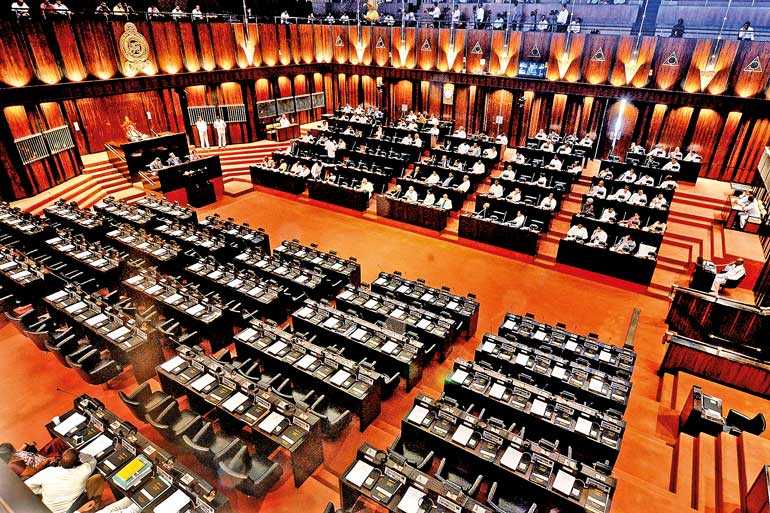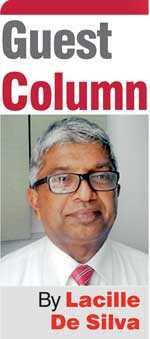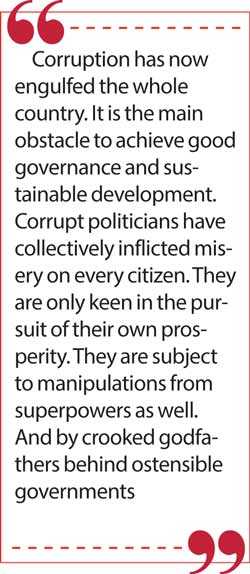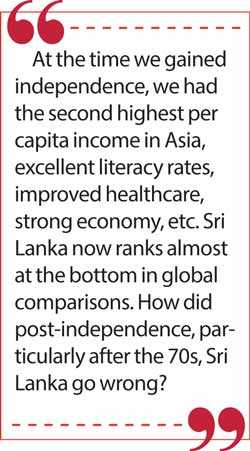Sunday Feb 22, 2026
Sunday Feb 22, 2026
Tuesday, 25 August 2020 01:11 - - {{hitsCtrl.values.hits}}

The Parliament was disgustingly manipulated
Sri Lanka is a country that has the attraction of all global superpowers due to its geographical importance. It is located in one of the busiest maritime routes in the world. The United States of America and India too are competitors to have a stake in the country, in addition to China. Trincomalee harbour is another attraction. It is one of our greatest assets, one among the five best natural harbours in the world.
After ending the brutal war, Sri Lankan rulers have failed to achieve economic progress due to their narrow-minded acquisitiveness. They ignored good advice. They began listening only to those who told them what they wanted to hear. The ensuing culture they created is a destructive process. Power has become addictive from top to bottom.
Their greed for power, arrogance, extravagance and the dislike to listen to others destroyed the country. They subvert the law and the key state institutions. They are judiciary, public sector institutions, and media, to name a few. The Parliament was disgustingly manipulated. They destroyed the opposition. Such destructive leaders craftily extended beyond their self-interests to build a motivated and inspired team of acolytes. They are also equally bellicose and self-centred.
At the time we gained independence, we had the second highest per capita income in Asia, excellent literacy rates, improved healthcare, strong economy, etc. Sri Lanka now ranks almost at the bottom in global comparisons. How did post-independence, particularly after the 70s, Sri Lanka go wrong?
Can we regain our lost glory? It cannot be achieved unless our political leaders commit themselves to address the vice of corruption. Furthermore, the present status of affairs in the country is totally attributable to the culture of impunity, corruption and bad governance.
Corruption has now engulfed the whole country. It is the main obstacle to achieve good governance and sustainable development. Corrupt politicians have collectively inflicted misery on every citizen. They are only keen in the pursuit of their own prosperity. They are subject to manipulations from superpowers as well. And by crooked godfathers behind ostensible governments.
The corrupt leaders have only favoured short term or immediate gratifications. Not the long term benefits. Entitlements such as infrastructure, education, healthcare, etc. have been curtailed. Water, electricity, etc. are overcharged. The poor citizens pay bribes to get their legitimate services. Corruption also undermines good governance, democracy, and the country’s competitiveness and revenue base. Corrupt leaders very often use various strategies to gain power. 
Idi Amin in Uganda won the hearts of the people by expelling foreigners and attacking Western Imperialism. In the 1970s, Sri Lankan leaders criticised the Soulbury Constitution. They had campaigned that the plantations owned by the British should be nationalised. A home-grown Constitution was the only remedy to develop the country according to them. What happened?
In Korea, by 1960, they had borrowed 25 billion dollars internationally for industrialisation. The rulers there had invested all those borrowings frugally. Money had worked wonders in Korea. China and other sources granted loans for our leaders. We have recklessly borrowed twice the amount and more, at much higher commercial rates as well.
Subsequently, the last government handed over the port of Hambantota to China on a 99 year lease together with 15,000 acres of lands.
The biggest worry is we have no way to calculate the overall losses. The destruction caused by our leaders after independence is inexcusable. They have sold our assets under numerous pretexts. The exploitation is deep-rooted in the bureaucratic and political institutions. In this article, corruption means “the use of public office for private gain”.
The theft of government financial resources too is another serious form of corruption. Politicians at national, provincial and local level have become filthy rich overnight. We have heard of instances where customs, inland revenue officers, and many others, pocketing out government revenue with collision of the payer. We have also heard of ‘ghost workers’ being paid.
Corruption thrives in our country
Corruption therefore thrives in our country. Without ‘political will’ at national level nothing can be done to fight against corruption. It fuels injustice, inequality, and deprivation. The culture of impunity is a serious drawback. We have powerful politicians who have swindled foreign investors. This has discouraged foreign investors, who always seek a fair, competitive business environment. Rules on conduct and conflict of interest should be introduced. The Code of Conduct for Members of Parliament needs to be strictly enforced. 
Corruption is the modus operandi of kleptocrats. Corruption benefits only a handful. It lowers and affects the quality of lives of millions of people. Forty two percent live on less than two dollars a day. Numerous businesses, including professionals too practicing privately, tend to hide and not to disclose their actual income, to avoid taxation.
As a result, the income generated by many businesses, professionals etc exists outside the official economy. This has paved the way for the existence of a rapidly growing black money economy. It has grave and disastrous consequences. The danger is that there is a parallel black money economy operating side by side.
The watchdog institutions that should scrutinise government performance, such as the Auditor General (National Audit Commission), Procurement Commission and the media needs to be empowered. The Auditor General needs to be given surcharge powers. The Yahapalana government withdrew it at the final hour. Special Anti-Corruption bodies such as CIABOC should also be permitted to go after powerful politicians too. President Gotabaya should strengthen morality not corruption. President must strengthen ethical values to re-create a well-performing bureaucracy.
According to Dreher and Herzfeld, the effect of corruption on GDP growth is so huge. In Africa, an Economist had once observed that “Currently corruption and HIV/AIDS are the two major killers in Africa. Why is corruption a cancer? Because it destroys everything. It has the ability rapidly and insidiously to infiltrate and destroy the organs of the state. Once embedded, it is difficult to remove it. It strengthens - bad leadership, politics of the belly, greed and selfishness, clientelism, patronage, nepotism, weak institutions, lack of accountability and transparency, weak ethical values, weak judicial system etc. etc.
The World Bank in a report had highlighted “Corruption and corrupt leaders both deepen poverty and make it difficult for ordinary people to get ahead as a result of their own efforts”. Probably, owing to this reason, we have many times heard suggesting that it could have been far better if the colonial masters had continued in Sri Lanka without handing over the administration to the locals.
We have been forced into a serious debt crisis and the coronavirus pandemic too is threatening our lives simultaneously. It is amidst the onset of the deepest economic debacle globally. President Gotabaya should not any longer procrastinate the necessary reforms. President appears to be facing a difficult choice. The President should loosen the grip of vested interests rightfully and perform the most difficult task. It is the most magnanimous step, which could benefit the citizens.
The President should initiate reforms, restructuring, and rebuilding to improve the lives of our distressed people. If he opts to continue in the same old way amidst a colossal debt crisis, that could undoubtedly invite further troubles to the nation.
Another important issue at hand is the need to expedite matters with regard to the large number of corruption cases that had been pushed under the carpet. There have been no significant convictions for graft despite widespread evidence of pervasive corruption. Could the President start from 2015 Central Bank fraud allegedly committed by Ranil Wickremasinghe and the clan.
All these had been revealed at the investigations in the Presidential Commission how RW implanted Arjuna Mahendran, who has recently changed his name to Harjan Alexander. Wickremasinghe had also got the CB shifted into his own ministry which was in conflict with the law.
The Gotabaya government should simultaneously take necessary steps to work with the initiative begun by the World Bank (WB) Group and the United Nations Office on Drugs and Crime (UNODC) to help developing countries to tackle and prevent the theft of state assets critical to development. WB and UNDOC together had initiated a program called ‘Stolen Assets Recovery Initiative’ (StAR) to help countries like Sri Lanka to establish the legal tools and instructions required to recover the proceeds of corruption. Leaders and citizens who condone corruption are not patriots if they do not defend the nation.
The biggest hurdle
The biggest hurdle the President should manage is the ongoing superpower tensions to the best advantage of the countrymen. The shocking truth is that the country has been totally devastated by the two governments after ending the war. President has a hard task. Nevertheless, the President should secure our birth-right freedoms for all our people. This requires that the President engages diplomacy – be highly strategic and tactical, based on pragmatic choices without sacrificing the future of our children any further.
Ours is a representative democracy. We vote regularly at elections to elect our representatives. Whom we have elected are clueless about running a democratic governance. They are a law unto themselves. They value their pockets more than anything else. You can hardly find wisdom necessary to run statecraft inside the chambers of the Parliament.
Strengthening good governance and rule of law to create a vibrant democracy has become a dream. They are unaware that good government is the outcome of good politics. We expected that they would act in the best interest on our behalf. They too have contributed to the destruction of our motherland.
Parliament epitomises the very idea of democracy. It is the heart of our governance system. Any political party that does not adhere to constitutional and other legal principles should be denied the right to contest elections. That is the duty of the Independent Election Commission. Both politicians and public officials do not take the right path. It is said “Wisdom is knowing the right path to take; integrity is the ability to follow the right path”. When an independent Commission does not do what is right, it ceases to be an independent body. Independent Commissions too have now become rubber stamps of politicians for all purposes.
It is therefore obvious economic prosperity, happiness and success for the people cannot be built by immoral leaders. Prosperity is regarded as a reward for virtue. Power has corrupted our politicians and public officers absolutely. It is best if we could re-establish the statecraft and the government system that was institutionalised at the time we gained independence by the Soulbury Constitution. It is believed that a fresh Constitution is being drafted. Please do not destroy the country any further. Only a few amendments would be sufficient to clean up the elections system, etc.
Abraham Lincoln had said: “If you want to test a man’s character, give him power”. Both politicians and public officers must be told that they should earn their success after doing their very best to the people, and not at the expense of the people.
DeCelles, Professor of Management, University of Toronto says “When you give good people power, they are more able than others to enact that moral identity, to do what is right”. She had argued that power does not corrupt; it only heightens pre-existing ethical tendencies. It is no wonder pure thoughts cannot be easily planted in a mind accumulated with selfishness.
At present, our system is strongly presidential. The President is the Head of the State, Head of Government and the Commander-in-Chief of the Armed Forces. Besides, the constitutional power is further reinforced by the dominant majority in Parliament. President should use all his powers to save the country from all ills.
“Leadership and learning are indispensable to each other” John F. Kennedy. Thomas Hobbes had written that without an effective government society would be ‘solitary, poor, nasty, brutish and short’. Mahatma Gandhi had flawlessly said: “There is sufficiency in the world for man’s need but not for man’s greed”.
Contemporarily, the Parliament is the most indispensable institution in any country. However, with the establishment of the Executive Presidency, the Parliament has become weak and an appendage. In Sri Lanka, over domination of Parliament became a major governance problem. Public Service too is the same. And it has become excessively politicised too. Both elected representatives and appointed officials should consider that there is no greater honour than to be in public service.
They should also remember that when they assume public office, they should not forget that they are public properties. J.R. Jayewardene, who was the first Executive President, called the ‘old fox’ obtained undated letters of resignation from elected representatives. A referendum was held for the first time to postpone parliamentary elections. This was a case of denial of democracy by an undemocratic President. How he treated the elected representatives was demeaning. That was the beginning of the downfall of Parliament and the country.
Proportional representation introduced by JR has already proved to be a total failure. It had finally destroyed the Representative Governance system, independent judiciary and the nonpartisan public service. He paved the way for a third class nation and a third class-life for all our people. We should refuse to be treated so shabbily in that way.
Theoretically, by electing our representatives to the Parliament, we the people form the government to voice our opinion in Parliament. It is also believed that we participate in the decision making process, thereby upholding democracy. Parliament creates laws and policies required for running day-to-day governance. In Parliament, all political decisions should necessarily be agreed upon after an extensive debate and careful deliberations.
They do not know what they should support or reject. They simply vote as guided by their party whips. They then grumble that the 19th Amendment should be repealed. They have approved it by 215 out of 225. Another Maxim is: “The difference between a politician and a statesman is that a politician thinks about the next election. The statesman thinks about the next generation”.
Work for the ‘common good’
Elected representatives are expected to respond to the needs and aspirations of the citizens. In a democratic government, they should work for the ‘common good’ and to strengthen sustainable and equitable development. This is best termed as the ‘good’ aspects of the rule of the majority polity (constitutional government) Does that happen in Parliament?
We now need to understand that the trust in both the political system and the politicians have come lower down. And the crisis that had emerged has undermined parliament’s legitimacy and the ability to function. We have a number of elected MPs who have faced grave criminal cases. Parties very often brush off charges against them by saying they were victims of political vendettas.
The question that arises is when a man is convicted for murder, whether he should be allowed to sit in Parliament until his appeal is finalised. Parliamentary privileges do not give cover to protect criminals. As we have seen in other parts of the world, trust in government institutions matters a lot. “The only stable state is the one in which all men are equal before the law” – Aristotle.
All elected representatives should prioritise the need to concentrate on vital reforms needed in all areas. Avenues need to be created to gain lost credibility, efficiency, effectiveness, relevance, etc. They should also preserve and protect the strength and integrity of all democratic institutions. Sri Lankan Parliament has been adequately funded at all times even amidst the prolonged war. Elected representatives including the parliamentary staff should understand their ethical responsibilities towards the nation.
Sri Lanka is presently facing a severe financial crisis. Tied to this is the fact that anti-corruption efforts have miserably failed to-date. We did not have honest and accountable leaders. Behind it all lies an insatiable appetite for money. Added to it, they are well aware that power can deliver immense wealth to them. A recent study has found that billions of dollars are lost due to corruption. Not only that, all that holds back socio-economic progress and it also threatens peace, security and stability.